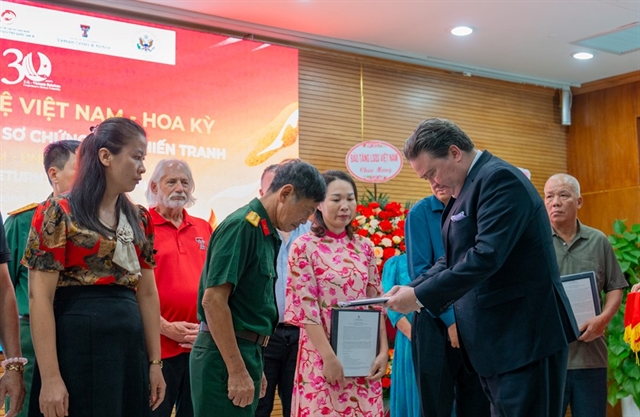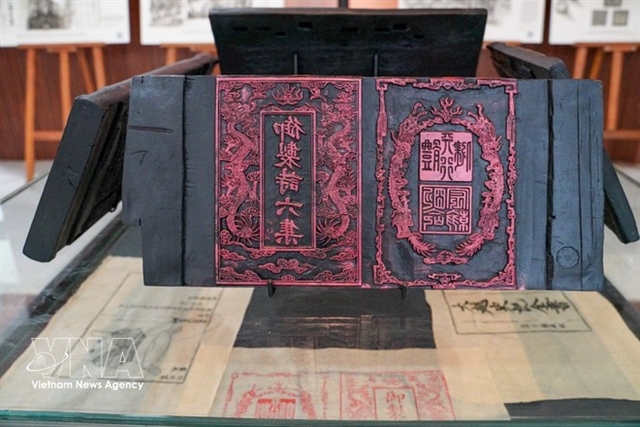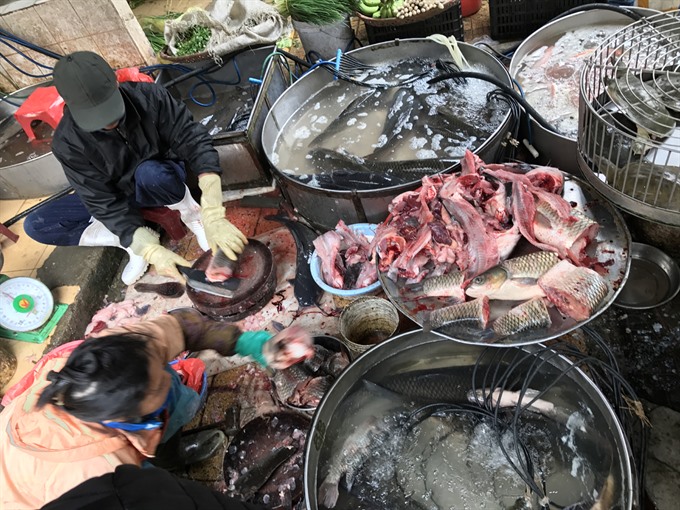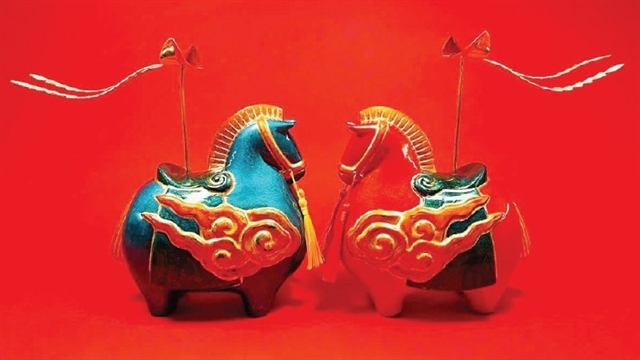 Society
Society

The Hà Nội People’s Committee has directed the strict control of food origin and production to ensure food safety.
 |
| Fish sold at Hà Nội’s Đồng Xuân Market.The Hà Nội People’s Committee has ordered more food safety and hygiene inspections as Tết (Lunar New Year) approaches. — VNS Photo Thái Hà |
HÀ NỘI – With the Tết (Lunar New Year) festival just weeks away, the Hà Nội People’s Committee has directed strict controls over all aspects of food production, including its origins.
Inspections will be carried out over all stages, from production to distribution. The city’s move is part of implementing the Prime Minister Nguyễn Xuân Phúc’s instructions on strengthening the State management over food safety, consolidating food safety inspection teams at local levels and increasing certification of food safety and safe food facilities.
Management of local wholesale markets will be tightened and the role of inter-sector inspection teams enhanced to ensure food safety in canteens as well as street food stalls.
The municipal Department of Agriculture and Rural Development has been asked to control production inputs and grant food safety certificates to eligible facilities.
The capital city’s population of 7.5 million people is served by 20 trade centres, 12 super markets, 460 traditional markets and 454 wet markets. Around 800-1,000 tonnes of meat, 340-400 tonnes of seafood, and 2,500 tonnes of fruits and vegetables are consumed everyday.
Local production meets 60 per cent of food demand and 18 per cent of demand for fruits and vegetables. The rest of the demand is met with goods from other localities in the country and imported from foreign markets.
NA inspection
In a working session with the municipal People’s Committee yesterday, National Assembly vice chairman Phùng Quốc Hiển said food safety was a major concern in Việt Nam at present, particularly the capital city.
A NA delegation led by Hiển had recently checked the implementation of food safety regulations in areas around Hà Nội and found several shortcomings.
Trần Văn Minh, Deputy head of the NA’s Science, Technology and Environment Committee, said abattoirs in Chương Mỹ District’s Hữu Văn Commune were all located within residential areas and failed to meet veterinary requirements. He detailed that some of the slaughter-houses are not licensed, the animals were not quarantined, and the slaughtering was done manually.
Another Deputy head of the committee, Phùng Đức Tiến, said the food safety violations at slaughter-houses were a matter of grave concern.
“It is urgent that the city tightens the organisation and management of livestock slaughter in the locality. Particularly important is that slaughtering zones are set up to minimise unhealthy practices,” Tiến said.
They were informed that local authorities plan to implement several measures in tandem to reduce the number of small abattoirs to 30 per cent in the next five years.
Visiting two vegetable growing areas in Đông Anh District’s Vân Nội Commune, Ngô Thị Minh, deputy head of the NA’s Committee for Culture, Education, Youth, Adolescents and Children, said a few establishments have applied scientific and technological advances in vegetable cultivation, but results remained modest. She recommended that Hà Nội also plans concentrated zones for growing safe vegetables.
Officials told the NA deputies that Hà Nội has been expanding the area of growing safe vegetables in accordance with the VietGAP standards, and has signed co-operation agreements with provinces and cities nation-wide to develop production chains with clear origins.
Tighter still
Food safety inspection teams have been set up with inspectors from the ministries of Health, Agriculture and Rural Development, Industry and Trade, Science and Technology, Public Security, and other departments and agencies.
These teams will carry out inspections in 12 cities and provinces: Hà Nội, Bắc Ninh, HCM City, Bình Phước, Khánh Hòa, Ninh Thuận, Phú Thọ, Tuyên Quang, An Giang, Đồng Tháp, Gia Lai and Kon Tum. At the same time, cities, provinces, districts and communes will establish inspection teams of their own to check food hygiene and safety in their localities.
The inspections are aimed at evaluating State management of food safety from provincial to commune levels, as well as the observance of relevant regulations by producers, traders and caterers. Authorities are hoping to prevent violations in a timely manner, and minimise the number of food poisoning cases and food-borne diseases. — VNS




